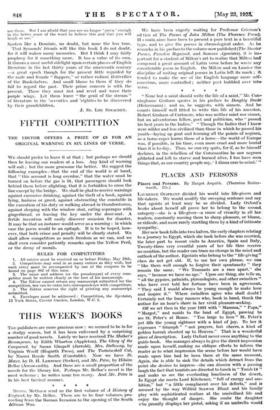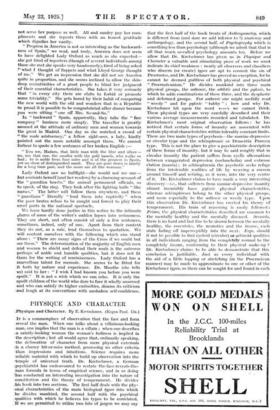PLACES AND PERSONS
Places and Persons. By Margot Asquith. (Thornton Butter- worth. 21s.) LAURENCE OLIPHANT divided his world into life-givers and life-takers. We would modify the sweeping sentence and say that egoists at least may be so divided. Lady Oxford's books about herself all prove her to belong to the second. category—she is a life-giver—a cause of vivacity in all her readers, constantly moving them to sharp pleasure, or blame, or ridicule, and more rarely startling them by a kind of intimate sympathy.
Her new book falls into two halves, the early chapters relating to a journey to Egypt, which she took before she was married, the later part to recent visits to America, Spain and Italy, Twenty-three very eventful years of her life thus receive no mention, but the reader can trace no change in the mind and outlook of the author. Egotists who belong to the " life-giving"' class do not get old. If, to use her own phrase, we can " like them well enough to forgive their spontaneity " they remain the same. " We Tennants are a race apart," she says, " because we have no age." Upon one thing, she tells us, " all the gypsies, palmists, phrenologists, and other swindlers 7 who have ever told her fortune have been in agreement. " They said I would always be young enough to make love and inspire it." Where swindlers agree who shall doubt ! Certainly not the busy runners who, book in hand, thank the author for an hour's share in her vivid pleasure-seeking.
Off we set then in the year 1891 with " Mamma," " Papa," " Margot," and maids to the land of Egypt, pausing to see St. Peter's at Rome. " Too large to love " St. Peter's yet fills the young sightseer with a kind of joy. To her it expresses " triumph " " not prayers, but cheers, a kind of golden hurrah shouted up to Heaven." That is a wonderful piece of description. Lady Oxford never owes anything to the guide-book. She manages always to give the direct impression made upon herself, making no oblique efforts to inform the reader as to what impression the scene before her would have made upon him had he been there at the same moment. Again, she is able to sink the details which detract from the point she desires to impress—she can dismiss with a passing laugh the fact that tourists are directed to lunch in " Tomb 18 " and make us see the everlasting loneliness of the desert. In Egypt she meets Lord Kitchener, " full of energy and am- bition," but " a little complacent over his defects," and is amused by the way Wilfrid Scaw en Blunt and his family play with sophisticated realism at the uncivilized life and enjoy the thought of danger. She snubs the daughter who proudly displays her pistol, asking if an umbrella would not serve her purpose as well. All and sundry pay her com- pliments and she repeats them with an honest gratitude which dignifies her vanity.
Progress in America is not so interesting as the backward- ness of Spain," we read, and truly, America does not seem to have delighted Lady Oxford as much as she expected—
she got tired of reporters (though of several individuals among those she met she speaks very handsomely), tired of being asked what I thought of flappers and what Lloyd George thought of me." We get an impression that she did not see America quite in proportion, and she seems inclined to allow the skin- deep eccentricities of a great people to blind her judgment of their essential characteristics. She takes it very seriously that in every city there are clubs to forbid or promote some triviality." She gets bored by their habit of comparing the new world with the old and wonders that in a Republic So proud it is possible to be congratulated after dinner because you were sitting " one off Mrs. So-and-So."
In " backward " Spain, apparently, they take the " fine company " business more simply. The traveller is greatly amused at the attitude of ordinary men and women towards the great in Madrid. One day as she watched a crowd of the male aristocracy," a fellow sight-seer, a lady, kindly , pointed out the more notable amongst them. We cannot forbear to quote a few sentences of her broken English :-
" You see, Madam, that little man with the blue and silver— no, not that one, the smaller with the gold tassels, who walks so bad ; he is noble from four sides and is of the greatest in Spain, yet no show of distinguished mark. They are gone down in family for a long time past, and the mans are all like woman."
Lady Oxford saw no bullfight—she would not see one— but contents herself (and her readers) by a charming account of the " guardian beasts," the animal permanent officials, so to speak, of the ring. They look after the fighting bulls " like nurses." The latter will follow them anywhere, and these " guardians " literally " lead them into captivity " when the poor brutes refuse to be caught and forced to play their cruel parts in the national spectacle.
We have hardly done justice in this notice to the intimate charm of some of the writer's sudden lapses into seriousness. They are short, and often consist of only a few sentences, sometimes, indeed, only of one. Apart from their context they do not, as a rule, lend themselves to quotation. We will content ourselves with the following which can stand alone : " There are many signs of the Cross if we could but
see them." The determination of the majority of English men .and women to shield and defend their souls is the outcome perhaps of noble and humble qualities, but it does not fit them for the writing of reminiscences. Lady Oxford has a marvellous talent for memoir. She seems to be fitted for it both by nature and experience. Dr. Munthe (she tells
MO said to her : " I wish I had known you before you were spoilt." It is not a wish which we can echo. It is only the
spoilt children of the world who dare to face it wholly unarmed and who can satisfy its higher curiosities, disarm its criticism Land laugh at its conventions with unshaken self-confidence.











































 Previous page
Previous page